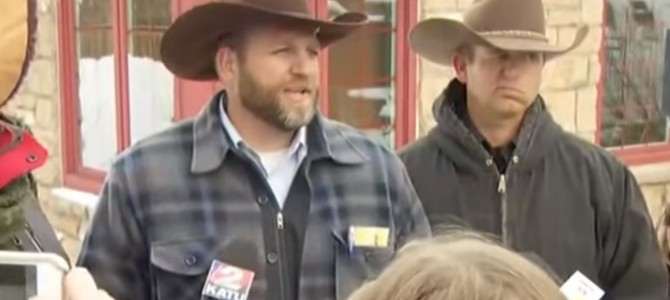
Unless you’re living in a cave in the wilderness, you’ve heard about the Hammond family—Oregon ranchers whose conviction on federal arson charges has prompted Ammon Bundy and a few of his armed buddies to stage some sort of bizarre armed sit-in at the headquarters of a National Wildlife Refuge.
Father and son Dwight and Steven Hammond were charged with arson after two fires set on their property spread onto federal land. The Hammonds insist the first fire was a controlled burn to remove invasive cedar trees, which got out of hand and spread to federal property. The second fire was also intentionally set as a “backfire” aimed at controlling a wildfire started by lightning. Although the government contends the facts of the two incidents are different, it is clear the Hammonds weren’t trafficking drugs, running a child prostitution ring, or dealing in counterfeit Benjamins.
Tragedy of Forced Errors
The Bundy Bunch hasn’t found much support for its efforts, and attention of both the media and the president has focused almost exclusively on further firearm regulation and the specter of domestic terrorism. It’s a shame for several reasons, but the most shameful offense is receiving the least coverage: the Hammonds’ case is a direct result of mandatory minimum sentencing, one of the most egregious abuses of state power.
At sentencing, the trial judge found the mandatory minimum of five years was too harsh, and reduced their sentences. The father served for three months, and the son for a year. Not content with the reduction, the Department of Justice appealed the sentence, and the Ninth Circuit ruled in their favor, ordering the Hammond boys back to jail, well after they had completed their first sentence. Despite very vocal opposition, the Hammonds returned to prison voluntarily, on January 4.
In an unsolicited show of support, Ammon Bundy—son of accused xenophobe Cliven Bundy, who held the feds off last year in Nevada over unpaid grazing rights—has gathered with his buddies and “occupied” the headquarters of the adjacent Malheur National Wildlife Refuge, which was vacant due to the holidays. Conjuring visions of Ruby Ridge and Waco, Bundy demanded all federal lands be turned over to the states, and vowed to use force if anyone tried to remove him. A Mexican standoff of historic proportions is now in place, and backing off would spell defeat for either group.
Remember, President Obama Loves His Pen
To date, the president has been conveniently busy with guns, ISIS, Hillary Clinton, Donald Trump, and his vacation in Hawaii, and hasn’t said much on the subject. His conspicuous silence on the matter—uncharacteristic for a man who doesn’t seem to care what anyone thinks of his second term—may have provided him the opportunity to solve the issue with the stroke of the pen he seems to love so much.
In 2015, President Obama pardoned 140 non-violent drug offenders in the name of “fairness” and “proportionality.” Using language that would make even libertarians blush, Obama spoke at the signing event of government as “Big Brother” and of the way forward by reforming sentencing guidelines that have unfairly incarcerated thousands of Americans.
If anything praiseworthy can be said about the president’s last term, his desire to reform the federal criminal justice system is among the most laudable. Thousands of Americans languish in federal prisons on drug charges, ruining future prospects of employment and guaranteeing extreme economic distress (if not outright poverty) on their families. Besides imposing a total lack of discretion on courts (the kind the trial judge initially used when he claimed the mandatory minimum sentence did “not meet any idea I have of justice”), mandatory minimums are constitutionally dubious and practically disastrous.
A Pardon Takes the High Ground
But how are Steven and Dwight Hammond any different? Now is time for the president to pardon the Hammonds, in the same way he pardoned drug offenders last year in the name of justice and efficiency. If mandatory minimum sentences are wrong for non-violent drug offenders, then they’re also wrong for Oregon ranchers who damaged less than 150 acres of a 187,000-acre refuge.
The winner of the current Bundy-government standoff will have to occupy the moral high ground, and a presidential pardon is a solid charge to the top of that hill. Ammon Bundy claims—maybe correctly—that the federal government has gone too far against simple ranchers like the Hammonds, and the back story to the arson charges certainly makes the Department of the Interior look like a greedy land baron. His crusade is uniquely moral, and seeks an outcome that involves the feds yielding to the common man. A presidential pardon would call Bundy’s bluff, and show reporters and ranch hands alike that common sense criminal justice reform is available to every American citizen.
If the president pardons the Hammonds, he takes the moral high ground, without having to yield to Bundy on control of federal lands. While nearly no one in polite society is willing to publicly side with the Bundys, a large percentage of Americans at least sympathize with his claims about federal overreach. A pardon accomplishes justice for the Hammonds, and puts a new shine on an Obama second term that has been accused of being a power-grab. Also, as Wilford Brimley said in the Quaker Oats commercial, “It’s the right thing to do.”









